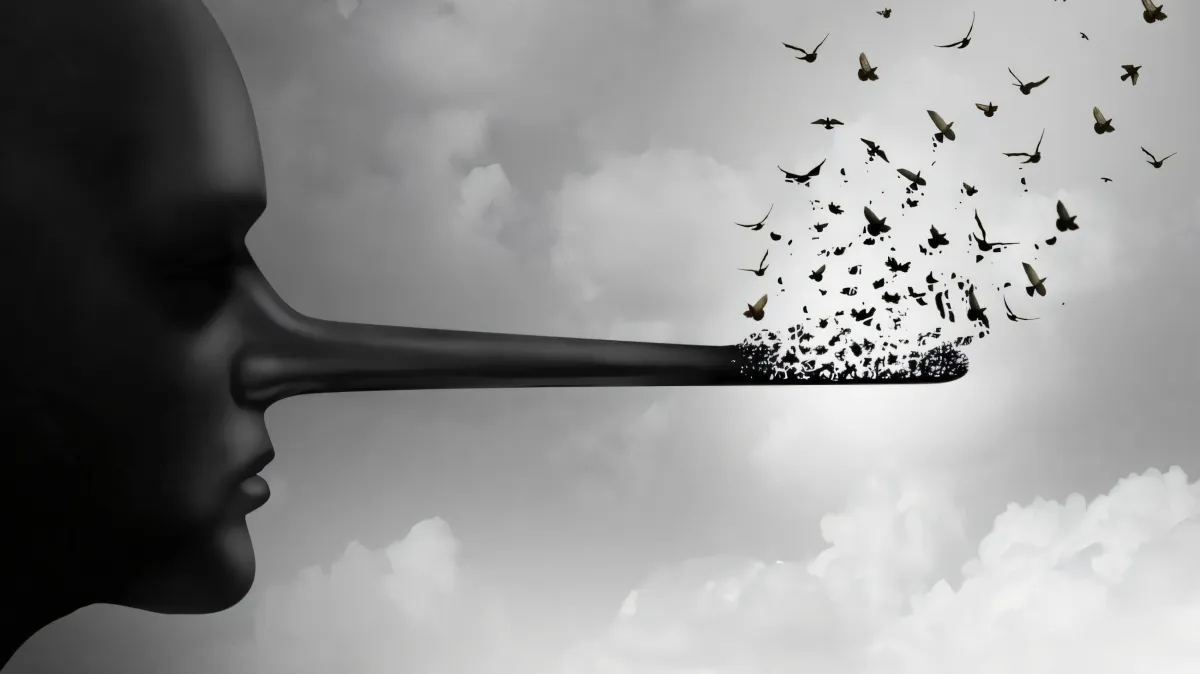When Should We Resist Being Too Honest?

I sit at a table, the sun long set, the friend across from me, upside-down bottle in hand, watching the last fated drops fall to his very empty glass. As I drink the last of mine, the all too familiar clinking of a semi-melted ice cube rattling along with an empty glass rings at the end of the conversation. I look at the bottle and think to myself that I have drunk enough, and it’s best to be wise and get a cab home. Lies. I’ll have just one more. A thought I will laugh about come sunrise.
We tell ourselves so many lies, like how we couldn’t eat another bite, just before dessert hits the table. The deceptions we throw around like the fake smiles shared in an elevator, pretending we care a lot about our fellow riders after they have left our eye line. Endless windy self-indulgences about eating better, spending less, or bettering ourselves.
From the very first time a person felt the joys of sin, we were then forced to carry the weight of our actions, and with the creation of shame, it became far less fun. That is until we got good at lying to ourselves. The sickness in our guts, sleepless nights, the unchecked passion of carnal instincts can be maddening. We have come to find it so much easier to wrap the pain in pretty words, to simply justify the hurt.
In my stack of books, stories heard, and late nights shared with a friend, my opinion has taken shape that beyond all things, what we seek most is truth. Not any truth, a hilariously processed truth. Honest to goodness no holds barred truth is too heavy. At the same time, half-truths and white lies lack the fat needed to sink our teeth in and tell ourselves we like them. We need what I call Masquerade gospel.
We want to be told honest things, with just enough deception blocking truths ugly side. The right amount of detail removed to make a cold truth seem magical. Those common or not revelations, with the caveat of skipping enough illicit details to make it bearable. Winning the best prize at a carnival booth is a pure joy to remember, so long as you leave out telling anyone you spent forty-seven dollars on tickets for the three dollar toy. We want our truths to wear a little mask, to hide just enough of itself that we are happy to see them as they present themselves.
A favorite, horrible, example of this, is a cold toilet seat in a public stall and the ignorance it grants us. When you sit down to a toasty warm seat you are forced to realize the truth about the common grounds you share with the thrones' previous patron. That is the kind of truth that brings agony and revolt to our day. We need that peace of mind that comes from denying ourselves logic whenever we can.
Are we stupid for lying to each other, and ourselves? Is it so wrong to lie when it just shields us from what we know, and would rather not dwell on? Santa himself exists in the hearts of children and the words of storytellers. He is a concept so genuine and pure until one is forced to learn the capitalism of Christmas, or how Santas jolly visage we know was crafted by Coca-Cola. What's important to take note of, is that to an extent, that's just fine.
It's okay that holidays have commercial aspects, some might agree it's a small price to pay for the memories we will cherish for years to come. It's great that we can hide from the dark and scary monsters of grown-up life, by telling each other ghost stories while we gather around a campfire. Alongside the truth, we have happy deceptions, another aspect of Masquerade gospel.
I will lie to you, that's the truth. Some live with chronic pain, hidden from the world to avoid passing the burden. Praising under-baked cookies, to further encourage a young hearts growing passion. We have to lie because the truth can be painful, in such a damning way that hearing it could cut worse than finding out there was a lie at all.
We will go so far as to tell complete lies, good health in the face of death, assuring heartache will fade or failures will be forgotten. These lies can be so powerful they become the truths that support us. The push and love from supporting friends and family will often empower a broken soul to steel itself once more, rise, and take on the challenges once more, renewed and inspired. Self-constructed ignorance for sure, but a necessary evil in my eyes.
Isn't that foolish? Why keep hope when we know we'll be forced to swallow yet another spoon of false promises? Some lie telling you everything is going to be ok. In reality, we have no reason to think that. There are special lies, they are the harshest denial of bad things, they are the ability to reject how little control we have over our lives, and instead set forth to find that which we want. If you ask me, that's a perfectly fair lie to tell.
The hardest part is figuring out which lies are beneficial, and which truths will cause harm. This is a concept that ensures will spent countless nights staring at the ceiling fan when I can’t fall asleep, until the very last breath I take. Without being able to tear these concepts apart, it's hard to say if I would be ready to accept the not so pretty lies. I will be happier in a world where I am ready to hear the supportive and heartfelt words that come my way, no matter how baseless they are.
In a world ever-changing in its challenges and complications, the only advice I can give is that you lie often, for good reason, and reject the dangerous truths. I look forward to someone I love, looking me in the eyes, and with no doubt in their mind, telling me how great everything is. I am ready to tell someone I love, I’ll be strong when they’re gone, knowing at that moment I couldn’t believe it less. I look forward to the lies that make the truth less scary.
Opinions and Perspectives
Really made me think about the lies we tell ourselves about self-improvement.
The way they described hope as a necessary deception is both beautiful and sad.
This helped me understand why I sometimes choose comfortable lies over harsh truths.
Great insights about social dynamics, but I still prefer more direct communication.
The article makes me think about how much energy we spend managing truth versus comfort.
I keep coming back to that carnival prize example. We all edit our stories, don't we?
That bit about rejecting dangerous truths really struck a chord with me.
The author really captures the nuance between harmful deception and protective cushioning.
This reminds me of how we handle grief. Sometimes those protective lies are necessary.
Fascinating take on social lies, but I worry it could enable harmful behavior.
The concept of Masquerade gospel feels like it explains so much about human interaction.
I love how they addressed the complexity of hope versus reality in difficult situations.
As a parent, this really speaks to me about the delicate balance of protecting while being honest.
Never realized how many daily lies we tell ourselves until reading this. Eye-opening stuff.
The article captures perfectly how we balance social harmony with absolute truth.
I wonder if younger generations are more inclined toward radical honesty than this masquerade approach.
The part about chronic pain hits close to home. Sometimes we hide our struggles to protect others.
That comparison of truth needing fat to sink our teeth into is such a clever metaphor.
I appreciate how the article acknowledges both the necessity and the danger of protective lies.
The way they described lies becoming supporting truths really resonated with my experience in therapy.
Interesting perspective on how we process truth. Sometimes a little cushioning helps us accept reality.
This article helped me feel less guilty about some of the white lies I tell to protect others' feelings.
The description of hope as a necessary lie is beautiful and heartbreaking at the same time.
I understand the premise but worry this could justify manipulation under the guise of protection.
Such a thoughtful exploration of how we use lies as social lubricant. Really made me think.
That part about staring at the ceiling fan really got to me. We all struggle with these moral decisions.
I find myself agreeing with most points but still feeling uncomfortable about advocating for dishonesty.
The author's point about commercial aspects of holidays is interesting. Maybe some lies do more good than harm.
Reading this made me reflect on all the little lies I tell my kids. Santa, tooth fairy, everything will be okay...
Great article but I think it misses how cultural differences affect our relationship with honesty.
Anyone else feel called out by that dessert example? I say I'm full right until the menu arrives.
The public toilet seat analogy is hilarious but makes such a good point about selective awareness!
Never thought about how much we lie to ourselves until reading this. It's kind of scary when you think about it.
I actually find it refreshing when people are brutally honest. No need for sugar-coating everything.
This reminds me of when my mom was sick. Sometimes those protective lies were what got us through each day.
The article beautifully captures how we navigate social situations. Those elevator smiles are definitely a form of necessary deception.
I'm torn about this. While I see the value in protective lies, I've been hurt by people who thought they were protecting me.
The carnival prize example is spot on. We all conveniently forget the less flattering details of our stories.
I work in hospice care, and this article perfectly captures the delicate balance we strike between hope and reality.
The author nails it about those late-night promises we make to ourselves about eating better and spending less!
Interesting perspective, but I think we need to be careful about normalizing deception, even well-intentioned deception.
The concept of Masquerade gospel is fascinating. I've never thought about truth-telling quite like this before.
I must say, I found the bar scene at the beginning very relatable. We all know that one more drink feeling.
We're not lying to ourselves, we're creating narratives that help us cope with reality. There's a difference.
This resonates with my experience in healthcare. Sometimes hope, even if slightly manufactured, can be more healing than brutal honesty.
I love how they described truth as needing to wear a mask sometimes. It's such a vivid way to think about it.
The article makes some good points, but I worry it gives too much permission for dishonesty. Where do we draw the line?
That bit about praising undercooked cookies to encourage a young baker really touched me. I've done the same with my niece's art projects.
Not sure about this. While I understand the concept of protective lies, they can backfire and cause more damage in the long run.
The part about Santa Claus and Coca-Cola really made me think. Sometimes commercialized myths can still serve a beautiful purpose.
I appreciate how the author distinguishes between harmful and beneficial lies. It's not as black and white as we often make it seem.
The toilet seat example made me laugh but it's so true! Sometimes ignorance really is bliss.
I disagree with encouraging lying, even if well-intentioned. Wouldn't we be better off learning to handle hard truths gracefully?
This article really hits home about the complex relationship we have with honesty. I find myself using these 'masquerade gospels' more often than I'd like to admit.
